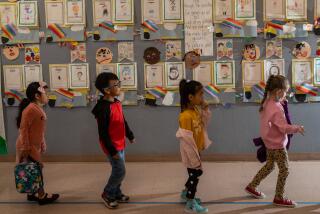TV Still Has the Capacity to Be Spellbinding
- Share via
I like a good battle on ESPN. Frazier versus Ali. Kidd versus Iverson.
The other day ESPN treated me to Buddiga versus Nalley -- duking it out on the National Spelling Bee.
This was anti-TV at its best: bookworms at their most awkward stage of adolescence, spelling words that none of us know and that even George Will or William Safire wouldn’t use in a sentence.
I have to admit that it was refreshing to see real contestants on television spelling “crustaceans” rather than eating them. But after the 10th completely unfamiliar word, I started to get irritated.
Why would anyone, let alone a 13-year-old, want to be able to spell a word like “soavemente”? According to the pronouncer, it’s an adverb that means “sweetly.” The word isn’t even in my fat, hard-backed American Heritage Dictionary. At any rate, if you perform an act of kindness for me, I prefer you do it sweetly, not soavemente.
The goal of communicating, after all, is to say what you mean. Not an easy task and not something you witness being done in public very much. Can you spell “obfuscate”?
All writers know the power of choosing the right word. “Angry” isn’t really a synonym for “furious.”
To describe a relationship as tenuous isn’t the same as calling it strained.
You might describe rights as being enumerated if you were writing about the Constitution. Otherwise, you’d be better off saying the rights were spelled out.
William Strunk Jr., in “Elements of Style,” advises us to choose simple words. Safire has expressed this idea in a rule that demonstrates its own principle: “Never use a diminutive word when a small one will do.”
Yet here we are celebrating the spelling of words like “roriferous” and “stultiloquence” while, according to the National Commission on Writing, most first-year college students can’t write an essay that’s reasonably free of errors.
It’s like arguing over the temperature of fire while the house burns.
Of all the language arts, spelling is perhaps the most useless. It’s possible to be a good speller without being much of a reader or writer. Most spell-checking programs are pretty adept at catching spelling errors, but no software is very good at helping with style.
If we’re going to place language arts on the highest stage in this country, which unfortunately is television, why can’t we celebrate something more relevant than the spelling of stilted, polysyllabic words? Why don’t we televise a national poetry competition modeled after poetry slams? How about a national reading bee in which kids might read a famous passage of literature and be judged on their expressiveness and interpretation? Or even a national debate competition?
It might not be as exciting as “American Idol,” but it would surely beat watching kids sparring orthographically over words that quite possibly have never been used in a normal sentence.
Unless, of course, you’re a glutton for corporal retribution.
More to Read
The complete guide to home viewing
Get Screen Gab for everything about the TV shows and streaming movies everyone’s talking about.
You may occasionally receive promotional content from the Los Angeles Times.






